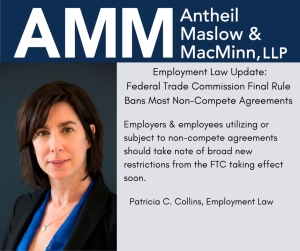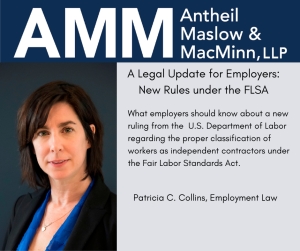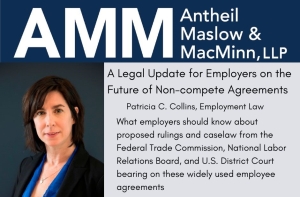THE UNITED STATES SUPREME COURT TAKES ON REVERSE DISCRIMINATION CASE
Reprinted with permission from the October 14th edition of The Legal Intelligencer. (c) 2024 ALM Media Properties. Further duplication without permission is prohibited.
On October 4, 2024, the United States Supreme Court granted certiorari to hear Ames v. Ohio Department of Youth Services, a case from the United States Court of Appeals for the Sixth Circuit. The Plaintiff in Ames alleged discrimination on the basis of her membership in a majority group – that is, Ames is what has come to be known as a “reverse discrimination” case. The case will resolve a split in the circumstances regarding the evidence required for an employee to make a prima facie case of “reverse discrimination”, and could require employers to reevaluate their diversity, equity and inclusion programs.
Mariam Ames is a straight woman, who was employed by the Ohio Department of Youth Services as an administrator. Ms. Ames applied for a promotion and was told during her interview process that she should retire. After the interview, Ms. Ames was demoted, and a gay male was hired to fill her administrator position. A gay woman was hired to the position for which Ms. Ames sought a promotion. Ms. Ames claimed that the Ohio Department of Youth Services discriminated against her on the basis of her sexual orientation. The United States District Court for the Southern District of Ohio granted the employer’s motion for summary judgment, finding that Ames had not shown the “background circumstances” necessary to support a prima facie case that the employer discriminated against a member of the majority group. The court applied the burden-shifting analysis in McDonnell Douglas Corp. v. Green, 411 U.S. 792 (1973), as courts do in all discrimination cases. The Sixth Circuit affirmed, citing its previous holdings that require reverse discrimination plaintiffs to make an additional showing to the McDonnell Douglas prima facie case. Not only was Ames required to show the “usual” prima facie elements, she must also show “background circumstances” to support a reverse discrimination claim. The Sixth Circuit noted that Ms. Ames easily made a prima facie case: her claim was based on sexual orientation, a protected class under Title VII; she was demoted from a position for which she was qualified; and she was replaced by a gay man. But, according to the Sixth Circuit, the case “foundered” on Ms. Ames’ failure to show the required “background circumstances”. The Sixth Circuit noted that reverse discrimination plaintiffs generally meet this “additional” burden, in the absence of direct evidence, by presenting evidence that a member of the relevant minority group made the decision at issue, or that there is statistical evidence of a pattern of discrimination by the employer against members of the majority group. The Supreme Court granted certiorari, and the case will be heard in the upcoming term.
FTC Non-Compete Rule: Legal Challenges Complicate the Compliance Timeline
Reprinted with permission from the June 8th edition of The Legal Intelligencer. (c) 2024 ALM Media Properties. Further duplication without permission is prohibited.
On April 23, 2023, the Federal Trade Commission (“FTC”) issued a final rule imposing a broad restrictions on non-competition agreements (“Final Rule”). The Final Rule requires employers to rescind existing non-compete agreements, and preempts conflicting state laws. The Final Rule is effective on September 4, 2024. In the meantime, there were three cases filed (one of which has been dismissed) that may result in a stay of implementation of the rule. This creates uncertainty for employers and employees in preparing for the effective date of the Final Rule. The Final Rule dramatically impacts both employers and employees. Employees subject to these agreements, and contemplating a move, may be waiting for September 4, 2024 to make decisions. Employers must prepare to determine to whom they will send rescission notices, and what steps they will take to ensure protection of trade secrets and customer relationships.
The Final Rule defines “non-compete clauses” as follows: any agreement that prevents a worker from, or penalizes a worker for, seeking or attempting to seek employment with any employer after the termination of their current employment. The Final Rule mandates that it is a prohibited unfair method of competition to enter into or “attempt to enter into” a non-compete clause with an employee, or to enforce an existing non-compete agreement, or to represent to an employee that they are subject to a non-compete without a good faith basis to believe they are.
The Federal Trade Commission's Final Rule Bans Most Non-Competes
On April 23, 2023, the Federal Trade Commission (“FTC”) issued a final rule imposing a broad restriction on non-competition agreements (“Final Rule”). The Final Rule requires employers to rescind existing non-compete agreements and would preempt conflicting state laws. The Final Rule is effective 120 days from its publication in the Final Register.
The Final Rule defines “non-compete clauses” as follows: any agreement that prevents a worker from, or penalizes a worker for, seeking or attempting to seek employment with any employer after the termination of their current employment.
The Final Rule mandates that it is a prohibited unfair method of competition to enter into or “attempt to enter into” a non-compete clause with an employee, or to enforce an existing non-compete agreement, or to represent to an employee that they are subject to a non-compete without a good faith basis to believe they are.
Accordingly, the Final Rule not only requires employers not to enter into or “attempt to enter into” employee non-compete agreements, it also requires employers to rescind their existing non-compete agreements, and then notify the current and former employees that the non-compete is rescinded within forty-five days of the rescission. The Final Rule provides a form for the notice of rescission. The obligation to rescind existing non-compete clauses does not apply to where a cause of action related to a non-compete clause accrued prior to the effective date.
The Department of Labor's New Independent Contractor Rule
Reprinted with permission from the February June 13th edition of The Legal Intelligencer. (c) 2024 ALM Media Properties. Further duplication without permission is prohibited.
On January 9, 2023, the United States Department of Labor issued a new final rule regarding the proper classification of workers as independent contractors under the Fair Labor Standards Act. While the rule is technically new, it is, in substance, a recitation of the applicable law regarding the proper classification of workers set forth by the Supreme Court.
Prior to recent rule making, caselaw guided the determination of whether a worker was an employee or independent contractor under the Fair Labor Standards Act (“FLSA”). In United States v. Silk, the United States Supreme Court outlined the factors relevant to the determination: degree of control, opportunities for profit or loss, investment in facilities, permanency of relations and skill required in the claimed independent operation. The Silk court noted that “no one factor is controlling.” Just about every court, federal or state, applies the same or similar standard to determine the issue under the FLSA or state statutes regarding minimum wage and overtime pay.
The Federal Trade Commission's Campaign to Eliminate Non-Competes
Reprinted from the October 18th edition of The Legal Intelligencer. (c) 2023 ALM Media Properties. Further duplication without permission is prohibited.
On January 5, 2023, the Federal Trade Commission (“FTC”) issued a proposed final rule that would result in a ban of non-compete agreements, and would require employers to rescind existing non-compete agreements. The public comment period for the rule terminated on April 19, 2023, but the FTC has acted aggressively to ban non-competes in the meantime. The FTC has filed complaints against companies that use non-compete agreements, resulting in consent orders that accomplish the recission of hundreds of existing non-compete agreements. The United States Department of Labor, the National Labor Relations Board and even the courts have also taken steps to deter the use of non-compete agreements.
The Ninth Circuit Permits a Title VII Claim Based On Offensive Music in the Work Place
Reprinted from the April 20th edition of The Legal Intelligencer. (c) 2023 ALM Media Properties. Further duplication without permission is prohibited.
In Sharp v. S&S Activewear, LLC, the United States Court of Appeals for the Ninth Circuit tackled the difficult issue of when a generally toxic workplace becomes a hostile environment under Title VII. 42 U.S.C. § 2000e-2(a)(1). The Ninth Circuit’s conclusion that employees’ allegations regarding playing offensive music in the workplace were sufficient to state a claim for a hostile work environment under Title VII relied on recent Supreme Court precedent, in Bostock v. Clayton County, 140 S. Ct. 1731 (2020); and Oncale v. Sundowner Offshore Servs, 523 U.S. 75 (1998).
Pennsylvania Human Relations Commission Adopts Specific Definitions of Protected Classes
Reprinted from the April 20th edition of The Legal Intelligencer. (c) 2023 ALM Media Properties. Further duplication without permission is prohibited.
On March 23, 2022, the Pennsylvania Human Relations Commission (“PHRC”) proposed new regulations to expand the definition of certain protected classes. The Amendments will create new Pennsylvania Code Sections at 16 Pa. Code §§ 41.201 – 41.207, and would expand the terms “sex”; “religious creed” and “race” for purposes of the Pennsylvania Humans Relations Act (“PHRA”) and the Pennsylvania Fair Educational Opportunities Act (“PFEOA”). The regulations were approved on December 8, 2022. The regulations are not yet in effect, but will become effective 60 days after publication in the Pennsylvania Bulletin.
The PHRA prohibits discrimination in employment because of race, color, religious creed, ancestry, age, sex, national origin or non-job related handicap or disability. 43 Pa. Stat. § 955(a). The regulations relating to the PHRA previously provided definitions only for the terms “pregnancy” and “disability due to pregnancy or childbirth”. 16 Pa. Code 41.101. The definition of the other protected classes was left to the PHRC’s guidance and cases interpreting the statute.
The amendments to Title 16 of the Pennsylvania Code would add a new subchapter, entitled “Protected Classes”, for the purpose of ensuring that all unlawful discriminatory practices proscribed by the PHRA and PFEOA are “interpreted and applied consistently”, and that all complaints filed with the PHRC “are investigated consistent with the rules outlined herein.” The regulations calls for liberal construction to accomplish the purpose of the PHRA and PFEOA.
The Federal Trade Commission’s Proposed Ban On Non-Competes
Reprinted from the February 10th edition of The Legal Intelligencer. (c) 2022 ALM Media Properties. Further duplication without permission is prohibited.
On January 5, 2023, the Federal Trade Commission (“FTC”) proposed rules imposing a broad restriction on non-competition agreements (“Proposed Rule”). The Proposed Rule would require employers to rescind existing non-compete agreements, and would preempt conflicting state laws. The ban marks a dramatic change not only in the law, but in the relationship between employers and their key employees.
The Proposed Rule defines “non-compete clauses” as follows: any agreement that prevents a worker from seeking or attempting to seek employment with any employer; or, any agreement that is a de facto non-compete clause. A de facto noncompete clause has the “effect of prohibiting the worker from seeking or accepting employment.” The Proposed Rule provides examples of a de facto non-compete clause: a non-disclosure agreement drafted so broadly that it effectively precludes the employee from working in their chosen field; or a contractual term that requires the employee to pay the employer or a third party its training costs if employment terminates within a specified time period, but only where the payment is not reasonably related to the actual costs incurred by the employer.
The Proposed Rule mandates that it is a prohibited unfair method of competition to enter into or “attempt to enter into” a noncompete clause with an employee, or to maintain an existing non-compete agreement, or to represent to an employee that they are subject to a noncompete without a good faith basis to believe they are.
The Trafficking Victims Protection Act and Liquidated Damages Provisions in Employment Agreements
Reprinted with permission from the October 14th edition of The Legal Intelligencer. (c) 2022 ALM Media Properties. Further duplication without permission is prohibited.
Employers eager to recapture the costs of hiring foreign citizens often use damages or repayment provisions in employment agreements. A recent case in the Southern District of New York illustrates a challenge to that strategy. The Southern District’s recent decision in Baldia v. RN Express Staffing Registry LLC to allow a complaint under the federal Trafficking Victims Protection Act (“TVPA”) to proceed, is part of a growing trend in using the TVPA to challenge such agreements.
The plaintiff in the Baldia case, Marie Alexandrine Baldia, is a citizen of the Philippines. RN Express Staffing recruited her from the Philippines and hired her as a registered nurse supervisor after sponsoring her visa to work in the United States. Baldia signed an Employment Agreement for a three-year term, that included a liquidated damages provision. Specifically, the Employment Agreement required that in the event Baldia left the employ of RN Express Staffing, “without cause”, before the end of the three-year term, she would need to repay the costs of “recruiting, training and placement”. The Employment Agreement recited that the “Company Recruitment Costs” totaled $33,320, and that the number would be reduced after her first full year of employment.
SUPREME COURT NARROWS THE APPLICATION OF THE FEDERAL ARBITRATION ACT
Reprinted with permission from the June 23rd edition of The Legal Intelligencer. (c) 2021 ALM Media Properties. Further duplication without permission is prohibited.
The United States Supreme Court narrowed the application of the Federal Arbitration Act (“FAA”) in its June 6, 2022 opinion in Southwest Airlines Co. v. Saxon, 596 U.S. ____ (2002). The case, along with the earlier case New Prime Inc. v. Oliveiri, 556 U.S. ____ (2019) , represents the narrowest narrowing of the Supreme Court’s broad holding in Epic Systems Corp. v. Lewis, 284 U.S. ____ (2018). In Southwest Airlines v. Saxon, the court answered the narrow question of whether an employee employed as a “ramp supervisor” fell within the Federal Arbitration Act’s exemption of “contracts of employment of seamen, railroad employees, or any other class of workers engaged in foreign or interstate commerce”, concluding that the workers did fall within the exemption. The case does not presage a trend towards narrowing the application of the Federal Arbitration Act, and instead demonstrates that the Court intends to encourage honoring arbitration agreements by insisting on a textual and precedential approach to the FAA.
Saxon was employed as a ramp supervisor at Southwest Airlines at Chicago Midway International Airport. At the beginning of her employment, she signed an employment agreement agreeing to arbitrate wage disputes individually. As a ramp supervisor, Saxon’s job was to train and supervise teams of ramp agents. Ramp agents are employees who physically load and unload baggage, airmail and freight. Occasionally, ramp supervisors assist ramp agents in loading and unloading cargo. Saxon filed a putative class action of ramp supervisors against Southwest, alleging violations of the Fair Labor Standards Act (“FLSA”). Southwest moved to dismiss, citing Saxon’s employment agreement which required arbitration pursuant to the FAA. Saxon argued that the ramp supervisors were exempt from the FAA pursuant to the exemption for “workers engaged in foreign or interstate commerce.” The United States District Court for the Northern District of Illinois dismissed the case, agreeing that the exemption did not apply. The United States Court of Appeals for the Seventh Circuit reversed, finding that the loading of cargo to be transported interstate is “itself commerce.” The Seventh Circuit’s holding conflicted with an earlier decision of the United States Court of Appeals of the Fifth Circuit. The Supreme Court granted certiorari and found that Saxon belong to a “class of workers engaged in foreign or interstate commerce”, and was exempt from arbitration.


























